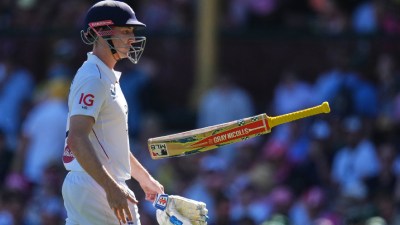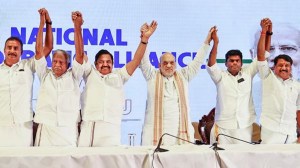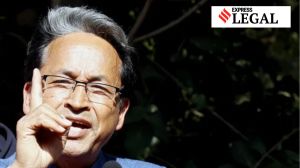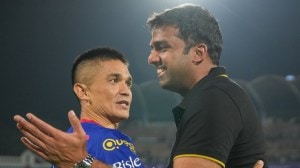Wali Baba, my adoptive father
Wali Baba passed away on January 26 at his favourite hour. At 7.15 am, between bed-tea and breakfast, he was usually to be found in his belo...

Wali Baba passed away on January 26 at his favourite hour. At 7.15 am, between bed-tea and breakfast, he was usually to be found in his beloved garden at 8216;Walibagh8217;, striding among the flower beds, planning the planting of new bulbs, assessing the balance of colour and fragrance, while his faithful gardener, half his age, struggled to keep pace with his energy and ideas.
Khan Abdul Wali Khan 1917-2006 was for some the son and political heir of Frontier Gandhi, Khan Abdul Gaffar Khan. For others, he was the founder and president of the Awami National Party and once a leader of opposition in the Pakistan parliament. For me he was Wali Baba, an adoptive father who welcomed a young woman he didn8217;t know into his home and treated her like a daughter.
I got to know Wali Baba in his seventies, when I was looking for help to conduct research on his father Khan Abdul Ghaffar Khan8217;s Khudai Khidmatgar movement. I wanted to write the story from the point of view of the rank and file, a seemingly impossible task for an Indian with no links in Pakistan. I had tracked Wali Khan down at his cousin Mohammed Yunus8217;s house in Delhi on one of his visits to India, and insisted he allow me an audience of just five minutes. At the end of the meeting, he assured my father, who had accompanied me, that his daughter would be safe under his protection and that he would help me do my work.
Nearly two years later, having failed to convince my department in the Delhi School of Economics that such a research project was viable, and having moved to Oxford, I did arrive in Peshawar. And, true to his word, he was there, with his wife Naseem Bibi, to meet me and take me to their wonderful home in Charsadda, 8216;Walibagh8217;. Over the next few months while I lived there, I travelled widely in the Frontier Province looking for surviving khidmatgars, and recording their stories.
When I returned at the end of each day, Wali Baba was my constant interlocutor. Inviting me to tuck my frozen feet under the sandalay, the stove under the dining table, he would want to hear what I had done during the day. I remember our daily ritual of listening to BBC World Service News. It was a privilege to hear him analyse the simplest events in historical terms. His story-telling skills were legendary. A favourite one, which he liked to narrate often, was a conversation he had with Gandhi during one of his visits to the Frontier. The young Wali had challenged the Mahatma8217;s philosophy of non-violence by pointing to a chicken in the yard. 8220;If the cook comes to slaughter this chicken8217;s baby,8221; he said to Gandhi, 8220;is non-violence on the part of the chicken likely to save the younger life?8221; The story ended with a twinkle in his eye when he remembered Gandhiji8217;s reply, 8220;Wali, you seem to have done more research on violence than I have on non-violence.8221; With the backdrop of the Afghan war and ready availability of Kalashnikovs for young mujahiddin, the story seemed to gain in poignancy.
Wali Khan will no doubt be remembered as a sound politician, an honourable Pathan, a brilliant orator, all of which he indeed was. But personally I will remember him as a 8216;father8217; who scolded me to tears 8216;a daughter doesn8217;t dare to reciprocate!, when I had dared to re-fill his car with petrol, of being forbidden from travelling to Afghanistan in disguise 8216;what will I tell your father if you are hit by a missile!8217; he had thundered at my risky plan, of being hugged every day and enveloped in the warmth of his family.
Wali Baba was more than a patriarch. He was a man out of time, who brought up his daughters as a liberal, encouraging them to pursue careers and not keep purdah. He was unusual in grooming his young wife to a political career in which she has flourished in her own right. He was demonstrative in his love, unusual for a man of his generation. He was always approachable in the tradition of the famous Pathan egalitarianism; he was embraced on innumerable occasions by his domestic staff, by the farmers on his orchards, by ANP party party workers. Wali Khan was offered the presidency of Pakistan on at least three occasions. He had declined for various reasons, not least because his party members suffered a worse fate through imprisonment after independence than before. They, like him, were always tainted by their 8216;friendship8217; with India: the legacy of the close alliance between the Khudai Khidmatgars and the Indian National Congress. With his passing, we have lost our last link with the politics of an un-partitioned subcontinent.
I trust that in his last moments on earth he was happy, as he always was in those early hours of the morning, among the flowers he loved so well.
The writer is Reader in Anthropology, University College, London. Her book, 8216;The Pathan Unarmed8217;2001 is published by James Currey and OUP
- 01
- 02
- 03
- 04
- 05































